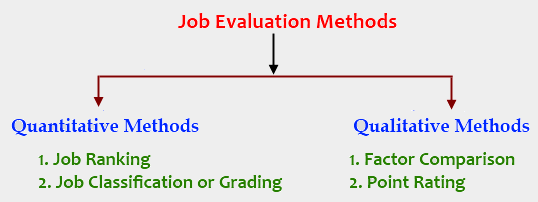If we take various contingent factors into account, we find that there may be differences in wage and salary structures. These differentials may be industrial and occupational, regional, organisational and personal. Industrial and Occupational Differentials : Industrial and occupational differentials exist because of requirement of different skill set and imbalance in demand and supply of personnel having such skills. Wages and salaries are usually fixed on the basis of skills required to perform a job. Thus, highly specialized jobs requiring higher level of skills are linked with higher pay too. Coupled with this, shortage of supply of such personnel also induces the payment of higher pay. Regional Differentials : Apart from industrial arid occupational differentials, there may be differences inContinue reading
Compensation Management
Job Evaluation Process
Job evaluation aims to provide this equity and consistency by defining the relative worth of different jobs in an organisation. Job evaluation is a process consisting of several steps. The following are the steps in job evaluation process: 1. Job Analysis Job evaluation process starts with the base provided by job analysis. Job analysis identifies various dimensions of a job in two forms: job description and job specification. Job description provides responsibilities involved in the performance of the job while job specification provides attributes required in the job performer. Both these taken together provide information about various factors involved in different jobs. 2. Appointment of Committee for Job Evaluation As pointed out earlier, job evaluation is a specialized function andContinue reading
Methods of Job Evaluation
For fixing compensation to different jobs, it is essential that there is internal equity and consistency among different job holders. Job evaluation is the process of determining the relative worth of different categories of jobs by analyzing their responsibilities and, consequently, fixation of their remuneration. The basic objective of job evaluation is to determine the relative contributions that the performance of different jobs makes towards the realization of organisational objectives. There are four basic methods of job evaluation: ranking method, job grading method, point method and factor comparison method. Out of these, first two methods are non-quantitative and also known as traditional, non-analytical or summary methods. The last two methods of job evaluation are quantitative, also known as analytical methods,Continue reading
Wage Determination Process
Wages can be expressed in two ways. When they are expressed in terms of money paid to the worker they are called nominal wages. But when they are expressed in terms of their purchasing power with reference to some base year they are called real wages. These wages are arrived at by making adjustment in the nominal wages for the rise or fall in the cost of living. How do we measure changes in the cost of living, or changes in the prices that consumers pay? The measuring rod is the consumer price index number. This index number is intended to show over a period of time the average percentage change in the prices paid by the consumers belonging toContinue reading
Compensation Management Process
In order to achieve the objectives of compensation management, it should proceed as a process. The compensation management process has various sequential steps as shown: 1. Organisation’s Strategy Organisation’s overall strategy, though not a step of compensation management is the starting point in the total human resource management process including compensation management. Companies operating in different types of market/product having varying level of maturity, adopt different strategies and matching compensation strategy and blend of different compensation methods. Thus, it can be seen that organisations follow different strategies in different market situations and align their compensation strategy and contents with these strategies. In a growing market, an organisation can expand its business through internal expansion or takeover and merger of otherContinue reading
Concepts of Compensation and Compensation Management
Concept of Compensation The literal meaning of compensation is to counter-balance. In the case of human resource management, compensation is referred to as money and other benefits received by an employee for providing services to his employer. Money and benefits received may be in different forms-base compensation in money form and various benefits, which may be associated with employee’s service to the employer like provident fund, gratuity, insurance scheme and any other payment which the employee receives or benefits he enjoys in lieu of such payment. Cascio has defined compensation as follows: “Compensation includes direct cash payments, indirect payments in the form of employee benefits and incentives to motivate employees to strive for higher levels of productivity” Based on aboveContinue reading



